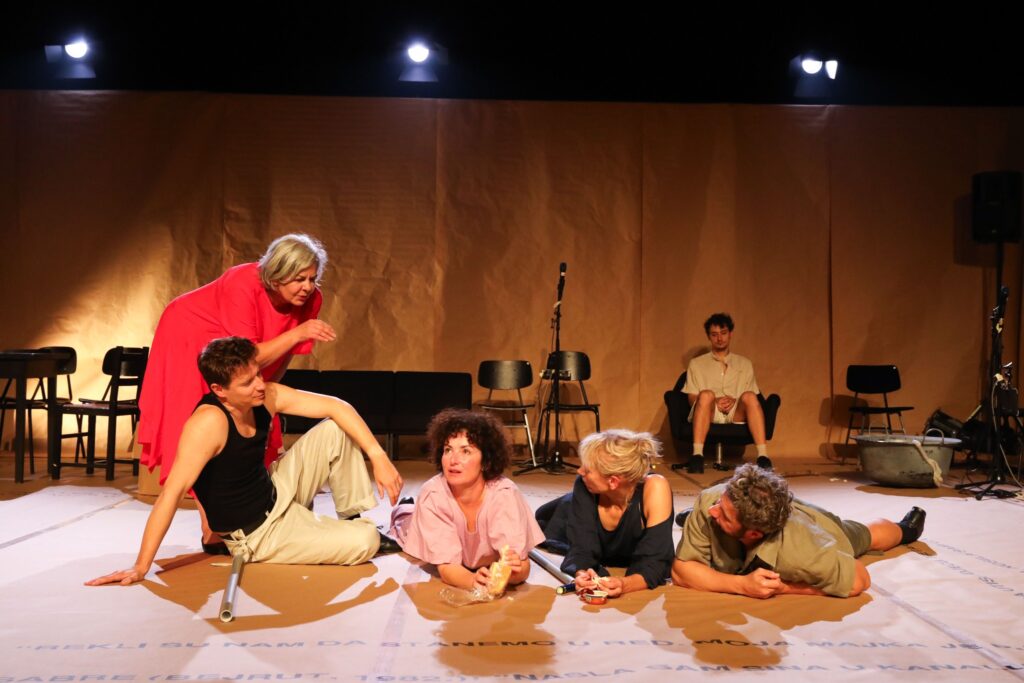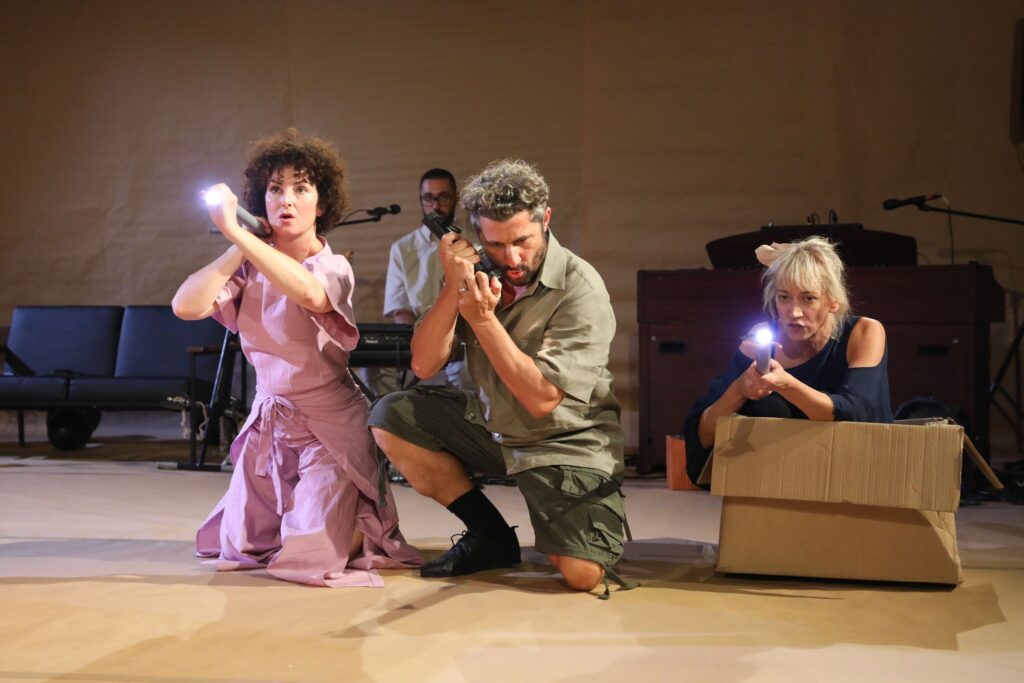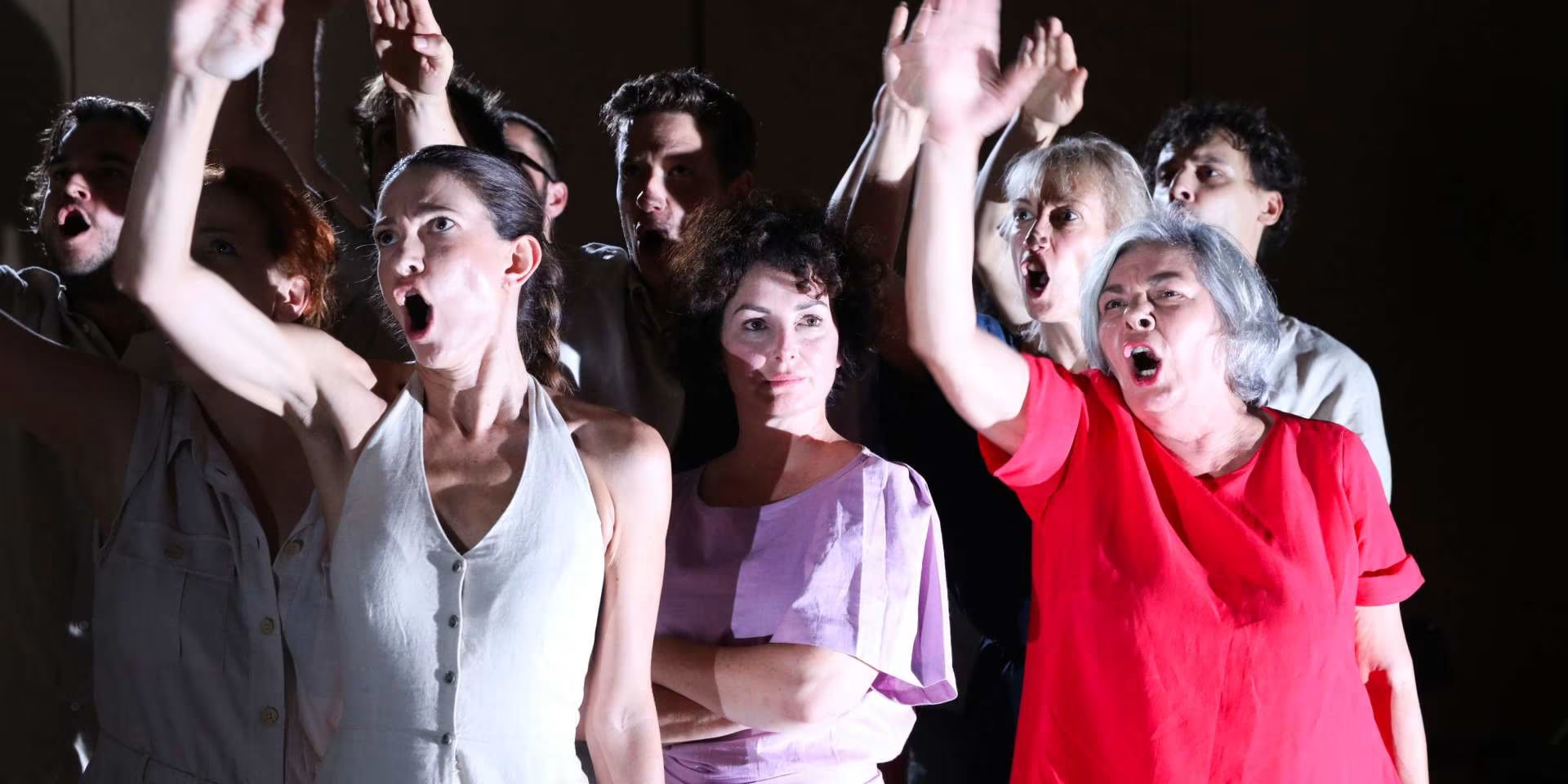Croatian National Theatre Zagreb, premiere 26th September 2025
The first drama premiere of the season at the Croatian National Theatre in Zagreb, Always Be Like a Dragon by Espi Tomičić and directed by Olja Lozica, is set outside of the main building, in the LADO ensemble space, not far from the theatre. The performance space is surrounded by tall brown cardboard, that functions as a barrier around rows of chair where some members of the acting ensemble are sitting around a wooden dining table (scenography by Vanja Magić).
We learn that this is meant to be an abandoned council apartment where a mother Jana (Vlasta Ramljak) brings her three children, Alen (Dušan Bućan), Matea (Olga Pakalović) and Anita (Lana Barić), to live. Jana broke into the apartment because she had nowhere else to go, her husband and father of her children is absent and their country is in the middle of a civil war. However, this abandoned apartment isn’t an ideal place for living as there’s no electricity, heating or water and she and her children need to be quiet so they don’t get evicted. The memories of these experiences are narrated by the character of Petar (Luka Dragić), a trans man who used to be Matea.
The play begins with radio news from the past and current tragic events, mostly focused on the wars in Gaza and Ukraine, but also Zagreb’s earthquake in 2020, Syria, Sudan, Somalia, Afghanistan – the list goes on, but the play predominately focuses on the horrors happening to Palestinian civilians, particularly children. Seeing the suffering of Palestinian children triggers Petar’s memories of squatting with his family and spending time playing in silence with his siblings. He wonders what does a ‘resistance movement’ mean today and what could it look like, in times which are significantly different than when earlier resistances took place – something I believe many are asking themselves too while aimlessly and helplessly scrolling through live testimonies of today’s wars around the world. In the middle of Petar’s monologue, another male voice interferes, his therapist (Dimitrije Simović) who’s trying to help him ground and calm his triggers.

Always Be Like a Dragon, HNK Zagreb
There’s a constant tension during the performance, be it in the family scenes of them hiding in the squatted apartment or in individual non-verbal tableau’s that are intertwined with the main plot point. As Petar describes in what conditions his family was living, the stage is in a total darkness and there’s only auditory stimuli like stage or prop movement and live music composed by Simović and Sara Renar. It’s almost as if the drama text is secondary to music in the play which turns out to be crucial for the performance, so the sound is the most dominant attribute of it. The music makes the play more visceral and impacts the audience more with sound and tableaus that can all be described as horror images of war, violence and death. The anxiety is further induced by acting ensemble continually changing their seating around the performance space, so much it seems like even they can’t stand seeing and playing the suffering calmly.
The three siblings; Alen, Matea (Petar pre-transition) and Anita, spend a lot of time mostly playing hide and seek, but they are also playing war as a pastime during a civil war from which they are running away. They are essentially imitating the outside reality where they have no control over what is happening to them, in order to gain control and try to process their emotions in the situation they have found themselves. Their ‘war’ game consists mostly of planning the scene they are too act out and arranging the improvised props and scenography they found in the apartment. Alen, the oldest, always repeats the same American phrases that he’s most likely heard from a movie or TV show. Eventually, they decide they have to come up with the name for their military unit and decide on Dragons, hence the title.
With real war outside, there are also the more introspective, more intimate and private battles that Petar discusses with his therapist. The most potent one is, of course, his relationship with his mother. The dialogue between Petar and his mother Jana often goes nowhere because they are both stubborn individuals who are easily riled up. Their first staged fight ends up in nit-picking the details of the past events, a lot he-said-she-said rhetoric is thrown around which leads both of them nowhere. Petar resents his mother for not talking to the about the situation they had found themselves in, and Jana accuses him of doing the same about his transgender identity, that he has never let her or his siblings inside his private world, he isolated himself and became hyper-independent. The conflict escalates further when Jana acts like everything her son is doing in life is to spite her and make her feel guilty because she couldn’t give provide a safe environment for the children, which peaks with her demanding respect because she birthed him. Her trying to exercise her parental authority and taking on the role of great martyr is very amusing but also irritating and Ramljak plays it masterfully.

Always be Like a Dragon. HNK Zagreb
Speaking of gender dysphoria, the scene of Matea’s first menstruation and her reaction to puberty is played by Pakalović as a visceral and touching moment of compassion for a young trans kid who feels lonely in their struggle with gender identity, as well as being poor and homeless. All the time Petar tells his childhood story, he’s an outsider to the events playing in front of him but towards the end, Matea tell him she will always be a part of him and invites him to join her and his sibling to their war game.
Just as Petar watches a war game of his childhood, so does the audience outside of theatre – the world watches in silence and weighs, a terrifying sentence said in the final moments of the performance, it lingers on the silence of the stage. However, the ensemble finishes with a short dance piece that resembles dabke, it’s very dynamic and it mirrors the living force of the survivors that continue to live their culture through intangible heritage like folk dances.
The final monologue, delivered by Marin Stević, goes on a little too long as it goes over the possible hypothetic scenarios on what would he do if he knew the end of the world was coming. The scenarios depend on how many time he has left: two weeks, a day, an hour, ten minutes. He says his last thought would be that ‘it was good’, meaning the life he had and then Simović jumps in and asks the audience what their final thought would be as the light fades out in the dark. The ending of Always Be Like a Dragon, and its final message, can be summed up in a popular meme-phrase: ‘The horrors persist, but so do I.’
Credits:
Director: Olja Lozica// Dramaturg Espi Tomičić//Composers: Sara Renar and Dimitrije Simović// Scenography: Vanja Magić//Costume: Ivana Stećuk//Choreography: Martina Hrlić Rogić//Light design: Milan Kovačević //Sound design: Vedran Peternel
Cast:
For further info, visit: hnk.hr
Further reading: Interview with Espi Tomičić: “It’s no longer shameful to talk about your background if you have grown up poor”
Nora Čulić Matošić (1998) is a student of Comparative Literature (MA) at the Faculty of Humanities and Social Sciences in Zagreb. She has written theatre criticism for the Croatian radio programme Theatralia and web portal Kulturpunkt.hr. Besides theatre, her interests are other forms of performing arts (particularly dance performances) and film.








